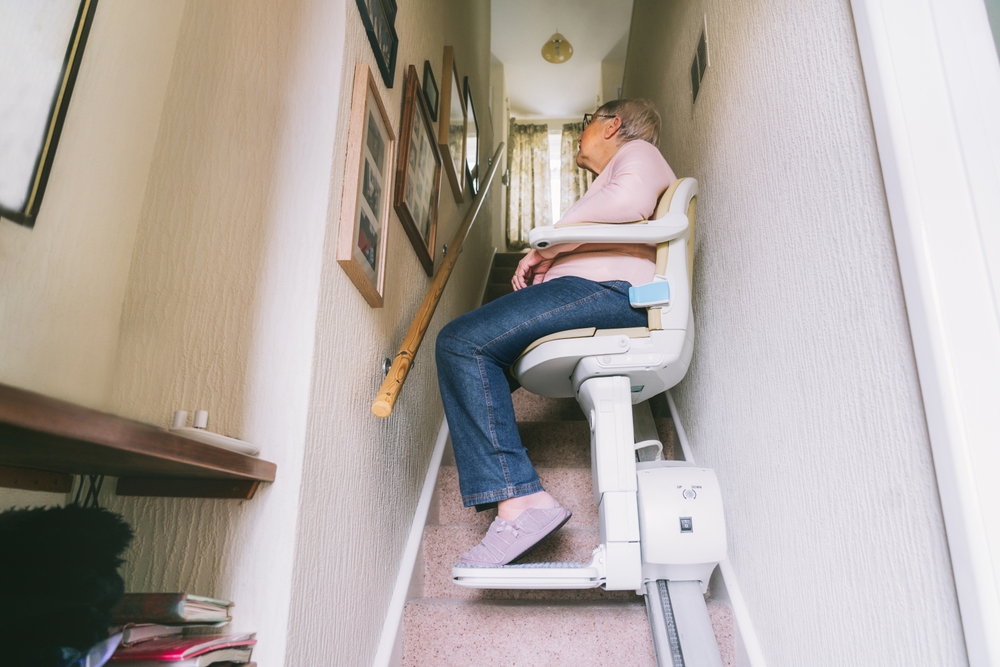How to Qualify for a Free Stair Lift UK

For many pensioners or those with mobility issues caused by an injury or long term disability, climbing stairs can become a challenging, if not insurmountable task. Stairlifts emerge as a vital solution, offering a blend of safety, independence, and comfort. However, the question of “How do you qualify for a free stair lift?” remains paramount for those facing financial constraints. This article aims to address that question comprehensively, guiding you through the process of assessing your eligibility for a free stair lift.
Table of Contents
Assessing Mobility Needs
Medical Evaluation
A crucial first step in qualifying for a free stair lift involves a medical assessment by a healthcare professional, such as an occupational therapist. This evaluation will focus on identifying mobility challenges that make stair navigation difficult. Conditions like arthritis, balance disorders, or recovery post-surgery can significantly impair one’s ability to climb stairs safely. The healthcare professional’s recommendation for a free stair lift underscores its necessity as a mobility aid, facilitating the next steps in the qualification process.
Physical Limitations
Physical limitations are a core consideration in determining the need for a free stair lift. For Pensioners experiencing difficulty with stairs, a stair lift is not merely a convenience but a necessity. It’s important to articulate how these limitations hinder daily activities, emphasising the stairlift’s role in enhancing quality of life.
Home Assessment
Staircase Evaluation
The physical structure of your home, particularly the staircase, is a critical factor. A stairlift company or an independent advisor will assess whether your staircase can accommodate a stairlift and determine the most suitable type—straight or curved. This evaluation ensures that the free stair lift fits seamlessly into your home, providing a safe and effective solution.
Space Requirements
Space considerations extend beyond the staircase itself to include landings and the necessary room at the top and bottom for safe embarkation and disembarkation. This aspect of the assessment ensures the stairlift’s installation and use do not compromise the user’s safety or the functionality of the home.
Many of our stairlifts are designed to fold neatly out of the way when not in use, helping to keep your staircase clear. We also offer bespoke rail solutions that can curve around bannisters or tight corners, ensuring a perfect fit for your home.
Financial Considerations
Personal Budget
Understanding your financial situation is essential. This includes assessing the feasibility of you being able to afford a reconditioned stair lift model, which can offer significant savings without compromising on safety or functionality.
Funding and Grants
In the UK, the Disabled Facilities Grant represents a potential funding source for those qualifying under specific criteria. Similar programs exist in other countries, offering financial assistance for home modifications that include stairlift installations. Investigating these options can significantly reduce the financial burden.
At Senior Stairlifts, we can offer stairlift finance to our customers. We have partnered with Snap Finance to give our customers the option to spread the cost of their new stairlift over a number of months to make the purchase more comfortable for them, if they are not eligible for a free stair lift.
If you would like more information on this you can see if it’s possible to get a discount, a grant, council support or charity donations for a stair lift.

Safety and Practicality
Safety Concerns
The suitability of a stair lift also hinges on safety considerations, including the user’s weight and size, as well as their ability to safely use the stair lift. Ensuring the chosen model accommodates these factors is crucial for the user’s safety and the stairlift’s efficacy.
Usage Training
Comprehending and comfortably using the stairlift’s controls is vital. Whether the user can operate the stair lift independently or requires assistance, understanding its functionality ensures a safer experience.
Legal and Compliance
- Building Regulations: Compliance with local building codes and regulations is mandatory, ensuring that the stairlift installation meets all legal requirements and safety standards.
- Landlord Permission: Renters must obtain permission from their landlords to install a stairlift, ensuring that the modification is allowable and does not breach the rental agreement.
Finding a Reputable Supplier
Choosing a reputable supplier is non-negotiable. A trusted supplier guarantees adherence to safety standards, provides a comprehensive warranty, and offers aftercare services, ensuring peace of mind for the user.
When researching reputable stairlift companies, it is important to find someone trustworthy. Here are some top tips on how to ensure they’re reputable:
- Some people are misled when purchasing a stairlift as they are told they are being sold a ‘new’ stairlift. However, they are being sold an old or outdated model. To ensure this doesn’t happen, it is important to research the stairlift you have been offered or even get quotes from other companies to compare with.
- There have also been reports of some dealers selling stairlifts and claiming to be a well-known brand, but turning out to be an inferior product and a different brand. It’s important to check that the company is an authorised brand dealer for certain other stairlift manufacturers.
- Always check the reviews. Some companies will operate under other names or organisations, so it is important to check the reviews to ensure that the company is providing a good service.
Psychological and Lifestyle Factors
Readiness
Adapting to the use of a stair lift involves psychological readiness. It signifies a lifestyle change, requiring acceptance and adjustment from the user. Embracing this change is pivotal for integrating the stair lift into the individual’s daily routine.
Product Options
Ensuring the availability of stair lift models that cater to the user’s specific needs, including features, controls, and aesthetics, is essential. The right product enhances the user’s experience and satisfaction.
When looking for a stairlift, it is important to do your research, look for features that you might like on your stairlift or what might make it easier for you. With Senior Stairlifts, our engineers will assess your needs and requirements and make sure to include any added extras you need.
Aftercare Services
Qualifying for aftercare services such as maintenance and repairs is crucial for the long-term usability and reliability of the stair lift. These services are fundamental to ensuring that the stair lift remains a safe and effective mobility aid.
In Summary
By thoroughly assessing each of these criteria, pensioners and senior individuals can determine their eligibility for a free stair lift. It’s a process that underscores the importance of safety, practicality, and improving the individual’s quality of life. Taking these steps seriously ensures that the investment in a stair lift is indeed a beneficial addition to the home, offering a blend of independence.
If you are in need of a home assessment for a free stair lift, we are able to send a friendly stairlift expert to assess your needs.